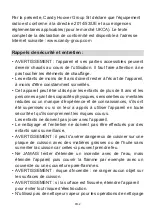
EN-7
•
The controls respond to touch, so you don’t need to apply any pressure.
•
Use the ball of your finger, not its tip.
•
You will hear a beep each time a touch is registered.
•
Make sure the controls are always clean, dry, and that there is no object (e.g. a utensil or a cloth) covering them.
Even a thin film of water may make the controls difficult to operate.
•
Only use cookware with a base suitable for induction cooking.
Look for the induction symbol on the packaging or on the bottom
of the pan.
• You can check whether your cookware is suitable by carrying out a magnet test.
Move a magnet towards the base of the pan. If it is attracted, the pan is suitable
for induction.
• If you do not have a magnet:
1. Put some water in the pan you want to check.
2. If does not flash in the display and the water is heating, the pan is suitable.
• Cookware made from the following materials is not suitable: pure stainless steel, aluminium or copper
without a magnetic base, glass, wood, porcelain, ceramic, and earthenware.
Do not use cookware with jagged edges or a curved base.
Make sure that the base of your pan is smooth, sits flat against the glass, and is the same size as the cooking zone.
Use pans whose diameter is as large as the graphic of the zone selected. Using a pot a slightly wider energy will be
used at its maximum efficiency. If you use smaller pot efficiency could be less than expected. Pot less than 140 mm
could be undetected by the hob. Always centre your pan on the cooking zone.
Always lift pans off the Induction hob – do not slide, or they may scratch the glass.
Touch Controls
Choosing the right Cookware
EN
G
LIS
H
Summary of Contents for HAIDSJP63MC
Page 5: ...EN 3 ENGLISH...
Page 6: ...Haier Haier EN 4...
Page 7: ...Haier EN 5 ENGLISH...
Page 23: ......
Page 43: ......










































